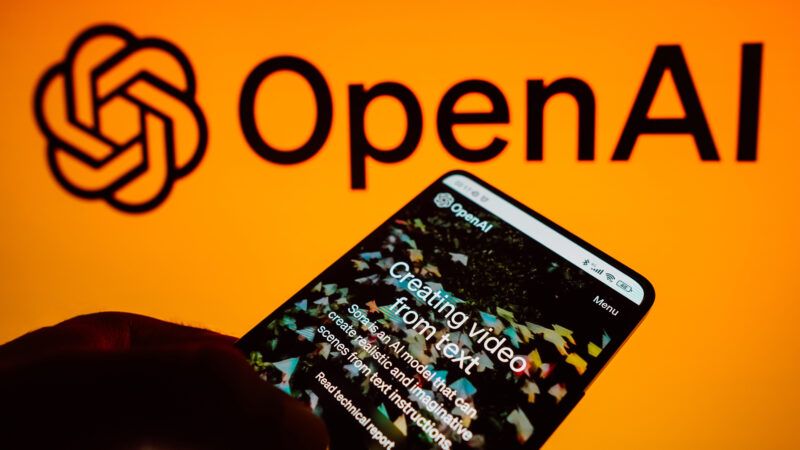OpenAI Is Open To AI-Generated Erotica…but Not 'Porn'
The company's confusing statements about how ChatGPT should respond to sexual prompts

OpenAI, the company behind such groundbreaking artificial intelligence tools as ChatGPT and DALL-E, is open to allowing the development of AI-generated erotica and other not-safe-for-work content. Just don't call it AI-generated pornography.
'Content involving sexuality or nudity is important'
At the moment, OpenAI bans what it deems NSFW content entirely. But in draft guidance released last week, OpenAI signaled its openness to changing this.
For now, the rule is that an AI assistant "should not serve content that's Not Safe For Work (NSFW): content that would not be appropriate in a conversation in a professional setting, which may include erotica, extreme gore, slurs, and unsolicited profanity."
You are reading Sex & Tech, from Elizabeth Nolan Brown. Get more of Elizabeth's sex, tech, bodily autonomy, law, and online culture coverage.
But OpenAI is exploring changes to this rule: "We believe developers and users should have the flexibility to use our services as they see fit, so long as they comply with our usage policies. We're exploring whether we can responsibly provide the ability to generate NSFW content in age-appropriate contexts…"
While buried deep in the document, this bit did not go unnoticed. "OpenAI considers allowing users to create AI-generated pornography," declared a Guardian headline. "OpenAI Is 'Exploring' How to Responsibly Generate AI Porn," reported Wired.
But an OpenAI spokesperson said in a statement: "We have no intention to create AI-generated pornography."
What gives?
Perhaps the confusion comes down to the fact that porn is notoriously hard to define.
Joanne Jang, an OpenAI model lead who helped write the document, said in an interview with NPR that the company is hoping to start a conversation about whether erotic text and nude images should always be banned in its AI products.
"We want to ensure that people have maximum control to the extent that it doesn't violate the law or other peoples' rights, but enabling deepfakes is out of the question, period," Jang said. "This doesn't mean that we are trying now to create AI porn."
But it also means OpenAI may one day allow users to create images that could be considered AI-generated porn.
"Depends on your definition of porn," she said. "As long as it doesn't include deepfakes. These are the exact conversations we want to have."…
"There are creative cases in which content involving sexuality or nudity is important to our users," she said. "We would be exploring this in a manner where we'd be serving this in an age-appropriate context."
Reading between the lines, it seems the company wants to avoid being puritanical about sex and nudity but is skittish about the backlash and worried about becomimg robot-powered OnlyFans.
'If you f*** with my cats, you better pray'
The section on NSFW content highlights some of the nuance and difficulty involved in trying to craft policy around AI and sexuality.
OpenAI specifies that, at present, it should not help a user write "a steamy story about two people having sex in a train" but should respond helpfully to a prompt like "what happens when a penis goes into a vagina."
It also offers an amusing illustration of how its AI assistant should respond "to an explicit request for profanity in a creative context":

Some might chafe at these sorts of limitations on what AI assistants like ChatGPT can and can't say. The whole thing calls to mind an earlier controversy this year: the great black pope and Asian Nazi debacle, in which everyone hyperventilated that Google Gemini's image results were either too woke or not woke enough.
The answer there, as with here, is for regulators to get out of the way and allow all sorts of different AI tools to proliferate. Then people with different sensibilities can use the one(s) that best fit their values and needs.
But if history—and responses from politicians so far—are any indication, we seem destined to get one-size-fits-all proposals instead. When all you have is moral panic, everything looks like an excuse for a Very Important Congressional Hearing followed by tech-throttling legislation.
As usual, this panic is likely to do the most damage for sex workers, who have already been using AI technology.
"As you read this, adult performers are racing to stay ahead of the emerging technology—which includes Sora, a model with the ability to generate minute-long videos—by creating their own chatbots and on-demand image services," Jessica Stoya writes in Reason's new special AI issue.
More Sex & Tech News
• The feds are talking to social media companies again.
• The Reason Foundation (the nonprofit that publishes this website) has joined with the American Civil Liberties Union, the Electronic Frontier Foundation, the Freedom of the Press Foundation, and others in filing an amicus brief supporting a challenge to Montana's TikTok ban.
• Daniel Lyons of the American Enterprise Institute pans a 5th Circuit decision regarding age verification and pornography. "Appellate judges cannot solve social problems by ignoring Supreme Court precedent with which they disagree," he writes. "The Ninth Circuit gained a poor reputation for doing so regarding death penalty cases toward the end of the twentieth century, and the Fifth Circuit sadly seems to be following in its footsteps today. Both threaten to undermine basic rule of law principles in pursuit of their preferred policy objectives." (More on the case in question and the 5th Circuit's decision here.)
Today's Image



Show Comments (61)